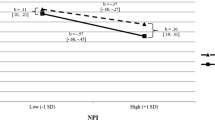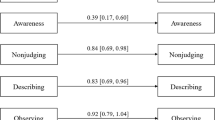Abstract
Literature showed that dispositional mindfulness is associated with several benefits, but especially acting with awareness reduces the automatic and habitual behaviors. In this study, we explored the moderating role of acting with awareness, on the relationship between social value orientation and individuals’ in-group-love vs. outgroup-hate. We hypothesized that acting with awareness would reduce the automatic and habitual proclivity of prosocial individuals to prefer in-group love and the tendency of proself individuals to prefer out-group hate. Moderated regression analyses were conducted on 103 Dutch university students (73.80% female; Mage = 23.62, SDage = 7.27), that participated to the Ingroup Prisoner’s Dilemma-Maximizing Difference- Game (IPD-MD) and completed a questionnaire which contained demographic information and measures of dispositional mindfulness and social value orientation. Firstly, findings showed a significant model on the difference score between ingroup-love and outgroup-hate, confirming that prosocial participants showed more ingroup-love and less out-group hate, compared to proself participants. Two further moderated regression analyses on ingroup-love and outgroup-hate respectively, indicated that acting with awareness moderated the association of social value orientation both with ingroup-love, and with outgroup-hate, in the expected directions. All the models explained a proportion of variance of dependent variables larger than zero. In some cases, mindfulness is not optimal per se and it can have unexpected detrimental consequences. Our study provides a first look into the potentially more negative consequences of mindfulness, providing a contribution to the growing literature about mindfulness, that often focused solely on its positive effects.


Similar content being viewed by others
Notes
As a check, we have also run the moderated regression analysis with the third behavioral choice (i.e. individualistic behavior) as dependent variable. As expected, the results did not show statistically significant results neither for the two main effects of AwA and SVO, nor for their interaction, corroborating our predictions. Because this dependent variable was not the focus of our study, this moderated regression analysis is not further reported.
References
Aarts, H., & Dijksterhuis, A. (2000). Habits as knowledge structures: Automaticity in goal-directed behavior. Journal of Personality and Social Psychology, 78, 53–63. https://doi.org/10.1037/0022-3514.78.1.53.
Baer, R. A., Smith, G. T., & Allen, K. B. (2004). Assessment of mindfulness by self-report: The Kentucky inventory of mindfulness skills. Assessment, 11(3), 191–206. Doi: 10.1177%2F1073191104268029.
Balliet, D., Parks, C., & Joireman, J. (2009). Social value orientation and cooperation in social dilemmas: A meta-analysis. Group Processes & Intergroup Relations, 12(4), 533–547. Doi: 10.1177%2F1368430209105040.
Bardi, A., & Schwartz, S. H. (2003). Values and behavior: Strength and structure of relations. Personality and Social Psychology Bulletin, 29(10), 1207–1220. Doi: 10.1177%2F0146167203254602.
Bargh, J. A. (1994). The four horsemen of automaticity: Awareness, intention, efficiency, and control in social cognition. Handbook of Social Cognition, 1, 1–40.
Bishop, S. R., Lau, M., Shapiro, S., Carlson, L., Anderson, N. D., Carmody, J., Segal, Z. V., Abbey, S., Speca, M., Velting, D., & Devins, G. (2004). Mindfulness: A proposed operational definition. Clinical Psychology: Science and Practice, 11, 230–241. https://doi.org/10.1093/clipsy.bph077.
Brown, K. W., Ryan, R. M., & Creswell, J. D. (2007). Mindfulness: Theoretical foundations and evidence for its salutary effects. Psychological Inquiry, 18(4), 211–237. https://doi.org/10.1080/10478400701598298.
Chambers, R., Lo, B. C. Y., & Allen, N. B. (2008). The impact of intensive mindfulness training on attentional control, cognitive style, and affect. Cognitive Therapy and Research, 32(3), 303–322. https://doi.org/10.1007/s10608-007-9119-0.
Chatzisarantis, N. L., & Hagger, M. S. (2007). Mindfulness and the intention-behavior relationship within the theory of planned behavior. Personality and Social Psychology Bulletin, 33(5), 663–676. Doi: 10.1177%2F0146167206297401.
Chiesa, A., Calati, R., & Serretti, A. (2011). Does mindfulness training improve cognitive abilities? A systematic review of neuropsychological findings. Clinical Psychology Review, 31(3), 449–464. https://doi.org/10.1016/j.cpr.2010.11.003.
De Dreu, C. K. (2010). Social value orientation moderates ingroup love but not outgroup hate in competitive intergroup conflict. Group Processes & Intergroup Relations, 13, 701–713. https://doi.org/10.1177/1368430210377332.
De Dreu, C. K., Greer, L. L., Handgraaf, M. J., Shalvi, S., Van Kleef, G. A., Baas, M., et al. (2010). The neuropeptide oxytocin regulates parochial altruism in intergroup conflict among humans. Science, 328(5984), 1408–1411. https://doi.org/10.1126/science.1189047.
Field, A. (2009). Discovering statistics using SPSSSage publications.
Giacomantonio, M., De Dreu, C. K., Shalvi, S., Sligte, D., & Leder, S. (2010). Psychological distance boosts value-behavior correspondence in ultimatum bargaining and integrative negotiation. Journal of Experimental Social Psychology, 46(5), 824–829. https://doi.org/10.1016/j.jesp.2010.05.001.
Greenwald, A. G., & Pettigrew, T. F. (2014). With malice toward none and charity for some: Ingroup favoritism enables discrimination. American Psychologist, 69(7), 669–684. https://doi.org/10.1037/a0036056.
Halevy, N., Bornstein, G., & Sagiv, L. (2008). “In-group love” and “out-group hate” as motives for individual participation in intergroup conflict: A new game paradigm. Psychological Science, 19(4), 405–411. Doi: 10.1111%2Fj.1467-9280.2008.02100.X.
Halevy, N., Chou, E. Y., Cohen, T. R., & Bornstein, G. (2010). Relative deprivation and intergroup competition. Group Processes & Intergroup Relations, 13(6), 685–700. Doi: 10.1177%2F1368430210371639.
Hill, C. L., & Updegraff, J. A. (2012). Mindfulness and its relationship to emotional regulation. Emotion, 12(1), 81–90. https://doi.org/10.1037/a0026355.
Kabat-Zinn, J., & Hanh, T. N. (2009). Full catastrophe living: Using the wisdom of your body and mind to face stress, pain, and illness. Delta.
Keng, S. L., Smoski, M. J., & Robins, C. J. (2011). Effects of mindfulness on psychological health: A review of empirical studies. Clinical Psychology Review, 31(6), 1041–1056. https://doi.org/10.1016/j.cpr.2011.04.006.
Kline, R. B. (2015). Principles and practice of structural equation modeling. London: Guilford publications.
Moore, A., & Malinowski, P. (2009). Meditation, mindfulness and cognitive flexibility. Consciousness and Cognition, 18(1), 176–186. https://doi.org/10.1016/j.concog.2008.12.008.
Ouellette, J. A., & Wood, W. (1998). Habit and intention in everyday life: The multiple processes by which past behavior predicts future behavior. Psychological Bulletin, 124(1), 54. Doi: 0033-2909198/$3.00.
Rand, D. G. (2016). Cooperation, fast and slow: Meta-analytic evidence for a theory of social heuristics and self-interested deliberation. Psychological Science, 27(9), 1192–1206. Doi: 10.1177%2F0956797616654455.
Ryan, R. M., & Deci, E. L. (2004). Autonomy is no illusion: Self- determination theory and the empirical study of authenticity, awareness, and will. In J. Greenberg, S. L. Koole, & T. Pyszcyn- ski (Eds.), Handbook of experimental existential psychology (pp. 449–479). New York: Guilford.
Salvati, M., Chiorri, C., & Baiocco, R. (2019). The relationships of dispositional mindfulness with sexual prejudice and internalized sexual stigma among heterosexual and gay/bisexual men. Mindfulness, 10(11), 2375–2384. https://doi.org/10.1007/s12671-019-01215-6.
Schneider, W., & Shiffrin, R. M. (1977). Controlled and automatic human information processing: I. detection, search, and attention. Psychological Review, 84(1), 1–66. https://doi.org/10.1037/0033-295X.84.1.1.
Teper, R., Segal, Z. V., & Inzlicht, M. (2013). Inside the mindful mind: How mindfulness enhances emotion regulation through improvements in executive control. Current Directions in Psychological Science, 22(6), 449–454. Doi: 10.1177%2F0963721413495869.
Van Lange, P. A., De Bruin, E., Otten, W., & Joireman, J. A. (1997). Development of prosocial, individualistic, and competitive orientations: Theory and preliminary evidence. Journal of Personality and Social Psychology, 73(4), 733–746. Doi: 0022-3514/97/53.00.
Verplanken, B., & Holland, R. W. (2002). Motivated decision making: Effects of activation and self-centrality of values on choices and behavior. Journal of Personality and Social Psychology, 82(3), 434–447. https://doi.org/10.1037/0022-3514.82.3.434.
Availability of Data and Material
The data that support the findings of this study are available from the corresponding author upon reasonable request.
Code Availability
Not applicable.
Funding
This study was not funded by any grant.
Author information
Authors and Affiliations
Contributions
MS executed the study, contributed to conduct data analyses, and wrote the paper.
MG designed the study, contributed to conduct data analyses, and edited the final manuscript.
FTV collaborated with the design and edited the final manuscript.
Corresponding author
Ethics declarations
Conflict of Interest
The authors declare that they have no conflict of interest and no competing financial interests exist.
Ethical Approval
All procedures performed in studies involving human participants were conducted in accordance with the ethical standards of the institutional and national research committee and with the 1964 Declaration of Helsinki and its later amendments or comparable ethical standards. This article does not refer to any studies with animals performed by any of the authors. The research received approval by the Ethical Committee of XXX (Removed for blinded revision) University.
Additional information
Publisher’s Note
Springer Nature remains neutral with regard to jurisdictional claims in published maps and institutional affiliations.
Rights and permissions
About this article
Cite this article
Salvati, M., Giacomantonio, M. & Ten Velden, F. Dispositional mindfulness moderates the association between social value orientation and in-group love and out-group hate. Curr Psychol 41, 3625–3631 (2022). https://doi.org/10.1007/s12144-020-00853-7
Published:
Issue Date:
DOI: https://doi.org/10.1007/s12144-020-00853-7




